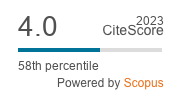Design and fabrication of A Ku-band low noise amplifier using FR-4 substrate
Linh Ta Phuong, Bernard Journet, Duong Bach Gia
Abstract
The low noise amplifier (LNA) plays an important role in many communication systems, especially at the receiver’s front-ends. In modern RF designs, The LNA is usually fabricated on a microstrip printed circuit board (PCB) due to its simplicity and ability of integrating flexibly with other components in a receiving circuitry unit. At frequencies lower than 6 GHz, the most prevalent substrate material for a microstrip LNA is FR-4 while at higher frequencies of over 10 GHz, it is challenging to design the LNA using this material without causing considerable losses to the RF signal. There are many works related to design microstrip LNA at high frequencies, however, the dielectric substrates used in most of them were high-cost materials for low dielectric loss. This paper introduces an LNA topology using the common, low-cost FR-4 substrate which can be operated in Ku-band for applications such as small satellites’ receivers, with the expected noise figure of lower than 1 dB, gain of around 10 dB and the return loss of around -10 dB. The stepped impedance matching technique has been used for transmission line optimization. The simulated and measured results are presented.
Keywords
FR-4; Ku-band; low noise amplifier; stepped impedance matching;
DOI:
http://doi.org/10.12928/telkomnika.v18i1.13196
Refbacks
There are currently no refbacks.
This work is licensed under a
Creative Commons Attribution-ShareAlike 4.0 International License .
TELKOMNIKA Telecommunication, Computing, Electronics and Control Universitas Ahmad Dahlan , 4th Campus+62 274 564604
<div class="statcounter"><a title="Web Analytics" href="http://statcounter.com/" target="_blank"><img class="statcounter" src="//c.statcounter.com/10241713/0/0b6069be/0/" alt="Web Analytics"></a></div> View TELKOMNIKA Stats


